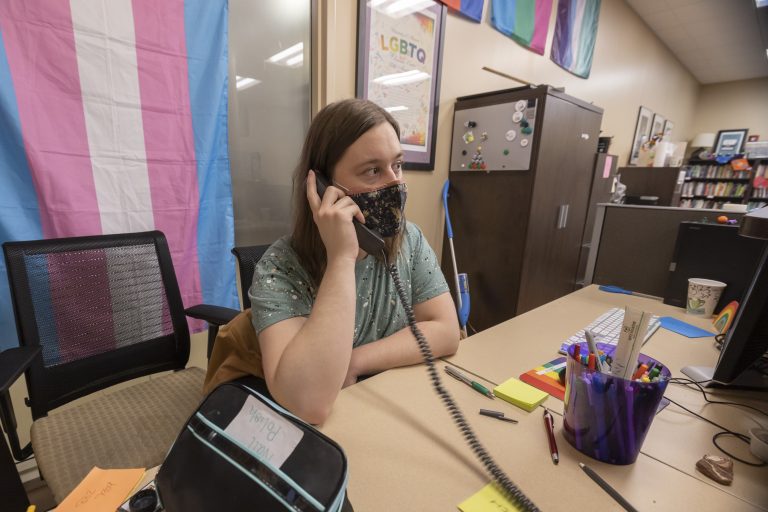Welcoming spaces

By Jesse Berlin
This story was originally published April 21, 2022.
In high school, Ray Jude Tubbs often felt like an outsider.
“I wasn’t exactly out as a queer person, per se, but most at my school seemed to clock me as different in some way – and they weren’t particularly accepting,” Tubbs said. They were able to make friends, but it was hard finding other queer people going through similar experiences.
Then, when Tubbs arrived at MU, they found the LGBTQ Resource Center, which works to foster a welcoming and inclusive environment for Mizzou community members with a focus on queer and transgender students.
It was refreshing, Tubbs said, to learn about a place on campus “for people like me.”
The LGBTQ Resource Center also hosts LGBTQ-related organizations that help many Mizzou students find community. For Tubbs, it’s Oasis, which welcomes members of the trans, non-binary, gender non-conforming and gender-questioning communities.
“We do a little bit of advocacy work. We do some amount of group discussions … We do field trips sometimes,” Tubbs said. Oasis also strives to educate people through events like “How to be a Better Trans Ally.”
“It’s basically just a panel of people from Oasis, people who belong to that general gender expansive identity, who are basically willing to answer questions from a crowd of what we’re assuming to be mostly cis people who are perhaps well meaning but want to hear like actual, tangible trans experiences rather than reading it in a book,” Tubbs said.
Another organization associated with the LGBTQ Resource Center is OUTLaw, the Law School’s LGBTQ and ally organization.
“[OUTLaw] provides a really good community of people that really care about one another,” OUTLaw president Brandon Bethel said.
The highly competitive nature of law school — where “everyone’s trying to get the best grades,” Bethel said — makes it difficult for students to build healthy communities there.
“Legal education has historically been one of the slowest to change or progress and has one of the lowest rates of diversity in American education programs,” Bethel said.
With OUTLaw, students can come together in an educational setting to “help support common struggles that many members of the LGBTQ+ community face.”
To raise money to support LGTBQ+-related causes, OUTLaw organizes events such as an annual variety show. “It’s one of the few times that professors and students and staff and all that can kind of commingle, do something fun that’s outside of the profession of law,” Bethel said.
The Mizzou Healthcare Pride Alliance (MHPA) helps students of the School of Medicine find community.
“We’re all going to encounter patients who are LGBTQ,” said MHPA President Anastasia Anazonwu. “How to provide the best care [including counseling, hormone replacement therapy and gender affirming care] for our patients who are LGBTQ is super important.”
MHPA hosts a drag night and other events for members and allies of the LGBTQ community.
“[Drag night] was such a great experience to see a lot of Mizzou medical students in that queer space,” Anazonwu said. “It gave me a lot of hope for what the next generation of doctors can look like.”
The LGBTQ Resource Center is “actively creating change and making the world better,” Tubbs said, “even if it’s in a small way for a small group of people. That’s invaluable.”
“It’s something people just have to experience themselves,” they added. “Please come visit us.”